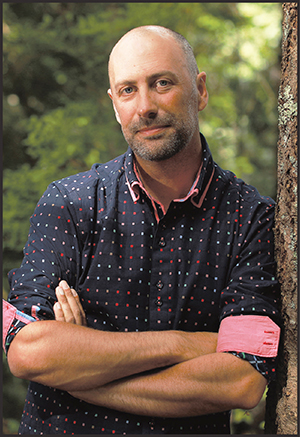Ry Moran | Movers & Shakers 2023—Educators
At the University of Victoria, Ry Moran has brought his experience to the libraries’ work of reconciliation, decolonization, and understanding Indigenous history, supporting students and faculty through a range of initiatives. The most recent of these is hosting and producing a podcast, Taapwaywin, which means “truth” or “speaking truthfully” in Michif, a language of the Métis people.
 |
CURRENT POSITIONAssociate University Librarian, Reconciliation, University of Victoria, BC DEGREEBA, Social Sciences, University of Victoria, 2002 FAST FACTMoran, who loves making music, composed the music for Taapwaywin. FOLLOWPhoto by Chad Hipolito |
Speaking Truthfully
In 2020, Ry Moran returned to his alma mater, the University of Victoria (UVic), to serve as the inaugural Associate University Librarian for Reconciliation. Moran, a member of the Red River Métis, was the founding director of the National Centre for Truth and Reconciliation at the University of Manitoba, where he worked to create a national archive for materials gathered by Canada’s Truth and Reconciliation Commission. The commission, established in 2008, addresses the legacy of abuse perpetuated by Canada’s residential school system, which forcibly separated Indigenous children from their families from the 1880s through the 20th century, forbidding them to speak their languages or acknowledge their culture.
At UVic, he has brought his experience to the libraries’ work of reconciliation, decolonization, and understanding Indigenous history, supporting students and faculty through a range of initiatives. The most recent of these is hosting and producing a podcast, Taapwaywin, which means “truth” or “speaking truthfully” in Michif, a language of the Métis people.
The podcast explores “the intersections of power, memory, and human rights,” Moran states in the introductory episode, centering Indigenous voices on such questions as the erasure of Indigenous identity, the occupation of stolen lands, and how history is written. “Why are the truths of Indigenous peoples so often suppressed?” Moran asks. “We need truth before we can get to reconciliation, so we’ve decided to take a deep dive into this concept.”
The spark for Taapwaywin originates in Moran’s conviction that the conversations happening around Indigenous history and ways of being deserve a wider audience, and his wish to engage more deeply into the questions he’s been asked—and answered—over the years. He strongly believes that Indigenous knowledge keepers, elders, survivors, academics, artists, and activists have significant contributions to make to these discussions, on campus and in the world. “I’m just an amplifier, or conduit,” he says.
A recent episode of the eight-part series is a reflection on erasure that examines the sunflower sea star, once ubiquitous along the Pacific coast of North America, but which has declined by some six billion over the past decade. Moran speaks with elders about their memories of the land and the environmental destruction taking place, “grappling with this conundrum of loss, and how we have responsibilities to remember,” he says. However, the episode ends on a hopeful note, he notes: “That the more we deepen our appreciation of some of these concepts, and breathe life into these principles, [the more] we’ll see some positive steps emerge.”
RELATED
ALREADY A SUBSCRIBER? LOG IN
We are currently offering this content for free. Sign up now to activate your personal profile, where you can save articles for future viewing










Add Comment :-
Comment Policy:
Comment should not be empty !!!